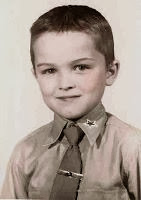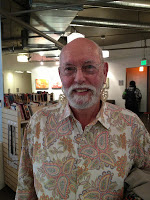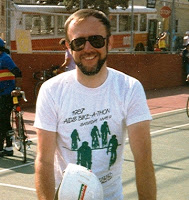November, so I took a stroll through the park, occasionally having a seat on
one of the many benches to soak up the sunshine and to watch the hundreds of
geese on the lake. The benches came in
handy, considering that it has been a very long time since I was able to take
twenty-mile, mountain hikes. My hips
were speaking to me, so I sought out another bench to rest.
moment already was occupied by one older woman.
I correctly guessed that she was babushka,
a grandmother from Russia. She appeared
to be friendly, so I asked if could join her.
She seemed glad to have the company and someone to talk to. With her heavy Russian accent, the
conversation was more “talk to” than “talk with,” for she did the majority of
the talking. That was OK with me because
everything she had to say was quite interesting.
although she could pass for fifty. She
lived most of her life in Yekaterinburg, the fourth largest city in Russia with
quite a history. Situated in the Urals
on the border of Europe and Asia, it perhaps is best known as the location
where, tragically, Czar Nicolas II, his wife, and all his children were
murdered and then buried in the forests nearby.
highly cultural city with ample opportunities to engage in the arts. In addition to all of its educational
facilities, it has more than thirty museums, plus several theaters, concert
halls, and opera houses. Several
world-famous operas singers got their start in Yekaterinburg.
culture should be part of everyone’s life.
Consequently, children are brought up to appreciate and to participate
in music and the arts and to be familiar with great literature. As it turns out, these pursuits are not just
simple hobbies; the families take them seriously. Before she acquired a degree in architectural
engineering, she first acquired a degree in classical piano performance. Now that is dedication!
her husband, her daughters, and her grown granddaughters. Yes, her daughters also acquired degrees in
music before pursuing degrees in their chosen professions. Now her granddaughters just have completed
their music degrees in Boulder.
that she very much misses her home and all the cultural opportunities left
behind, but she came to America because of her family. Her husband was offered a good
job-opportunity as an environmental planner here in America. He accepted it and moved here by
himself. His wife chose to remain behind
at home. Eventually, their daughters
joined their father in America, and Babushka
was left alone. Family is most important
to her, so finally she joined the family here.
about America; however, she has noticed a major difference in culture
here. There are some of the same
cultural advantages here as in her homeland, but at a very reduced scale and
with fewer and fewer people who truly are interested. There appears not to be the same society-wide
appreciation of the arts among the population or understanding that incorporating
arts and music into one’s life not only enriches human life but also, as proved
by several psychological / educational research-studies, enhances the ability
to learn other disciplines, a concept apparently lost upon school districts
that eliminate the arts first from their school programs as “non-essential.”
about. Since my childhood, the vast
majority of classical music radio stations in America have been disbanded
because of rapidly dwindling listenership and advertising income. Throughout America over the last generation,
the country has lost dozens of symphonies, theaters, opera companies, ballets
companies, and school arts and music programs.
could not afford to keep going and was disbanded. Apparently, Denverites will pay hundreds or
even thousands of dollars to go to football games and rock concerts, but many
far-less pricey symphony tickets were left half-unsold. World-famous musicians would arrive on stage
to the embarrassing view of oceans of empty seats. The failed symphony finally was replaced with
the Colorado Symphony. Then just last
year, most of the board left out of frustration, and the symphony again came
close to closing. It is keeping barely
alive by cutting the number of concerts, minimizing salaries, and traveling to
other venues with small groups of musicians to perform for a handful of
listeners.
view from America. For example, Germany
funds their national arts programs at a rate of dozens of times higher per
capita in contrast to America. They give
government funding to symphonies at a rate of 25 times that of America and
opera companies at 28 times. In
contrast, Mit Romney (when running for President) said that he would eliminate
all government support for the arts in this country, and he’s not the only one
to say that. Like many politicians the
past thirty years, he believes in so-called “small government” – – except of
course in the cases of increasing military spending, intruding into people’s
private lives, dictating women’s health choices, pushing religious beliefs into
school science programs, gutting the workers’ unions, and suppressing the right
to vote. Within the total military
expenditures for each year, a tiny fraction of goes to supporting military
marching bands; yet that amount of money is so huge in contrast to what is
provided currently to the National Endowment for the Arts that this sum could
resurrect and support twenty full-time symphony orchestras at $20 million apiece
plus give 80,000 musicians, artists, and sculptors an annual salary of
$50,000. But, the “cut-the-budget”
power-brokers in Congress never would do that.
finance minister recommended to Winston Churchill that they cut arts funding to
better fund the war effort. Churchill’s
response was, “Then what are we fighting for?”
There are numerous sociological and psychological articles written and
available for reading about the essential need for the arts to develop and
maintain a civilized nation with civilized people.
declined in America can be seen in what recordings the majority of Americans
choose to buy. Just ten years ago, the
local Barnes and Noble on Colorado Boulevard carried, in a large percentage of
the media room, hundreds of classical recordings on CDs and DVDs; and their
staff were graduate students from the Denver University Graduate School of
Music. That large display-area
continually shrank until only one small area by the back wall contained
classical music, and the only clerk was a high-school graduate who admitted
that she had no background in music at all.
With the recent renovation of the store and the reduction of the media
area to a minor space off to the far side, the stock has been minimized to
virtually nothing.
just to check out their DVDs. They had
only about a half-dozen of real quality and interest to me, five of which I
already had, and absolutely no classical CD section at all among the rap,
heavy-metal, hip-hop, country-western, pop, rock, and TV soundtracks. That is what sells in America with
recordings, live concerts, radio, and TV, and even the music chosen for
background noise even in so-called good restaurants.
including the two major ones in my area, have gone bankrupt and closed because
so few people now are interested in classical music and learning how to play
the piano. An article in the New York
Times described how many pianos now are taken to the dump because they often cannot
even be given away. The correspondent
spoke about watching as a bulldozer ran over and crushed a Knabe baby-brand
piano.
developed different priorities and values from that of many other advanced
nations. I recently finished watching
the BBC production of John Carré’s “Tinker, Taylor…” One particular quotation caught my attention. In questioning one of the characters in his
story as to why he was so unhappy with America, the man replied, “Do you know
what the problem is…? Greed, and
constipation…morally, politically, aesthetically.” If that statement seems extreme, the sad fact
is that many people hold the same feelings.
Unfortunately, since the book was written around forty years ago, a
similar view of America has persisted among many foreign nations in
particular. This cultural difference
between the grandmother’s home and what America has become has not been lost
upon her, either.
of her family and all their accomplishments, laments the culture shock that she
has experienced. She appreciates her
chance to come to America and to be reunited with her family. Yet at the same time, she speaks with
fondness and nostalgia of her once having lived in an environment of great
cultural opportunity.
 |
| Bosendorfer Grand Piano |
talk about, and I would have been glad to have heard more; however, the sun was
going down, and the air quickly was becoming chilly. Even my personal, extra insulation was not
enough to stave off the growing cold.
So, I thanked her for her conversation, bid her farewell, and headed
home, all the time weighing the possible social and personal implications of
her reported culture shock.
people and their life stories. I also
realize that, although my own life has not brought me particular fame or
fortune, I too have had some noteworthy experiences and, at times, unusual
ones. Since I joined this Story Time
group, I have derived pleasure and satisfaction participating in the group. I do put some thought and effort into my
stories, and I hope that you find them interesting.








